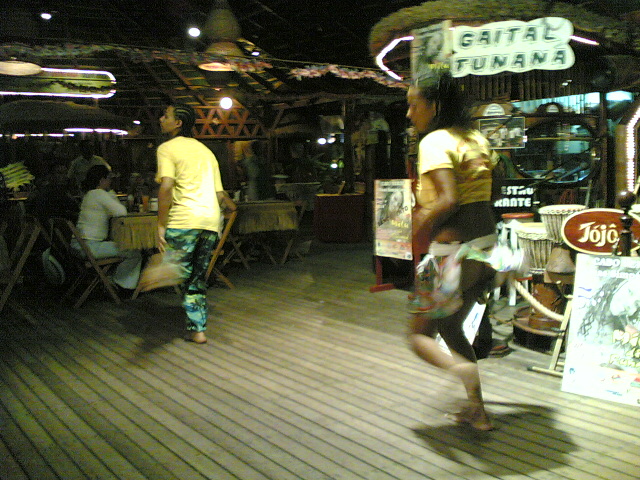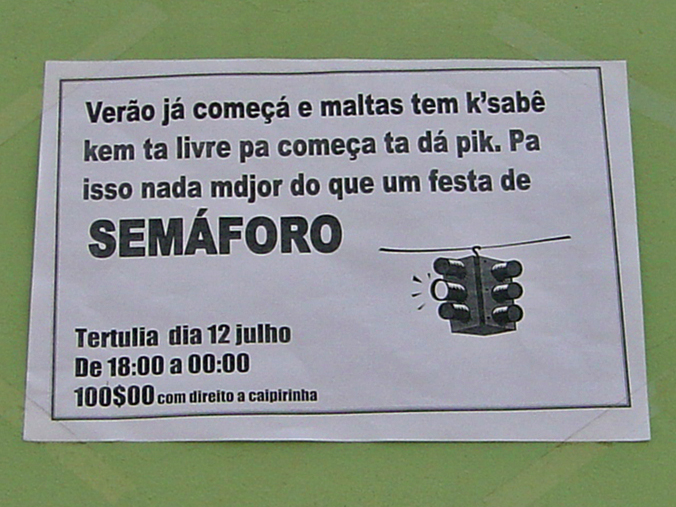|
Navega
''Navega'' is the debut album by the Cape Verdean musician Mayra Andrade Mayra Andrade (born 13 February 1985) is a Cape Verdean singer who lives and records in Lisbon, Portugal. Background Andrade was born in Havana, Cuba, to parents from Cape Verde, and she and her family returned to Cape Verde a few days after ..., released in 2006. It is sung in Cape Verdean Creole language. The title means "Sail". The album won the "German Records Critics' Award" (''"Preis der deutschen Schallplattenkritik"''). Its jury is composed of 114 musical journalists. Track listing Reception The album won the Preis der Deutschen Schallplattenkritik ( en, German Record Critics Award) in the World Music and Folklore category. References 2006 debut albums Mayra Andrade albums {{2000s-album-stub ... [...More Info...] [...Related Items...] OR: [Wikipedia] [Google] [Baidu] |
Mayra Andrade
Mayra Andrade (born 13 February 1985) is a Cape Verdean singer who lives and records in Lisbon, Portugal. Background Andrade was born in Havana, Cuba, to parents from Cape Verde, and she and her family returned to Cape Verde a few days after her birth. Andrade spent the first years of her life in Cape Verde, but because her father was a diplomat for the Cape Verdean government, she traveled extensively with her family and lived in many countries during her childhood. Hence, during her childhood, she lived in Senegal, Angola, and Germany. However, she spent around two months of the year in the Cape Verdean island of Santiago. Andrade moved to Paris in 2002 when she was 17 years old and lived there until late 2015 when she moved to Lisbon, Portugal. She is multilingual, but most of the lyrics of the songs on her albums are in her native Cape Verdean Crioulo language. The first song she remembers singing is "O Leãozinho" by the Brazilian musician Caetano Veloso, whom she has c ... [...More Info...] [...Related Items...] OR: [Wikipedia] [Google] [Baidu] |
Batuque (music)
The Batuque is a music and dance genre from Cape Verde. As a music genre As a music genre, the ''batuque'' is characterized by having an ''andante'' tempo, a 6/8 or 3/4 measure and traditionally it is just melodic, i.e., it is just sung, it has no polyphonic accompaniment. When compared with the other musical genres from Cape Verde, the ''batuque'' has a call and response structure, and it is the only genre that is polyrhythmic. In fact, analyzing the rhythm, one finds out that it is a 3-beat rhythm over a 2-beat rhythm. In its traditional form, the ''batuque'' is organized as if it were an orchestral ''crescendo''. It possesses two movements (if we may call them so): In older times the music began with an introduction on the ''cimboa'' that provided the base musical line. Nowadays the usage of that instrument is extinct. The first movement is called, in Creole, ''galion'' . In this movement one of the performers (called ''batukaderas'' ) executes a polyrhythmic hit, while th ... [...More Info...] [...Related Items...] OR: [Wikipedia] [Google] [Baidu] |
Funaná
The ''funaná'' is a music and dance genre from Cape Verde. ''Funaná'' is an accordion-based music. The rhythm is usually provided by the '' ferrinho'' much like the use of washboards in zydeco, the saw in Caribbean ripsaw music, the scraper in Sub-Saharan African music and the güiro in Latin and Pre-Columbian music. Characteristics As a music genre, the ''funaná'' is characterized by having a variable tempo, from ''vivace'' to ''andante'', and a 2-beat rhythm. The ''funaná'' is intimately associated to the accordion, more precisely to the diatonic accordion, commonly known as ''gaita'' in Cape Verde. This influences a lot of musical aspects that characterize the ''funaná'', such as the fact that, in its most traditional form, the funaná uses only diatonic scales, Gonçalves, C. F., '' Kab Verd Band'' — 2006 and not chromatic ones. The structure of a ''funaná'' composition is not very different from the structure of other musical genres in Cape Verde, i.e., bas ... [...More Info...] [...Related Items...] OR: [Wikipedia] [Google] [Baidu] |
Coladeira
The ''coladeira'' (; Cape Verdean Creole: ''koladera,'' ) is a music genre from the Cape Verde islands in the central Atlantic Ocean. It is characterized by a variable tempo, a 2-beat bar, and (in its most traditional form) a harmonic structure based in a cycle of fifths. The lyrics structure is organized in strophes that alternate with a refrain. The tone is generally joyful and themes often include social criticism. Instrumentation typically includes a guitar, a '' cavaquinho'', and percussion, among others. According to oral tradition, the genre originated in the 1930s when the composer Anton’ Tchitch’ intentionally speeded up the tempo of a '' morna.'' In the 1950s, it began to incorporate electronic influences, and beginning in the 1980s it was influenced by compas music from Haiti. ''Coladeira'' also refers to a ballroom dance done in pairs accompanied by the music. Genre As a music genre the ''coladeira'' is characterized by having a variable tempo, from ''a ... [...More Info...] [...Related Items...] OR: [Wikipedia] [Google] [Baidu] |
Mazurka
The mazurka (Polish: ''mazur'' Polish ball dance, one of the five Polish national dances and ''mazurek'' Polish folk dance') is a Polish musical form based on stylised folk dances in triple meter, usually at a lively tempo, with character defined mostly by the prominent mazur's "strong accents unsystematically placed on the second or third beat". The mazurka, alongside the polka dance, became popular at the ballrooms and salons of Europe in the 19th century, particularly through the notable works by Frédéric Chopin. The mazurka (in Polish ''mazur'', the same word as the mazur) and mazurek (rural dance based on the mazur) are often confused in Western literature as the same musical form. History The folk origins of the ''mazurka'' are three Polish folk dances which are: * '' mazur'', most characteristic due to its inconsistent rhythmic accents, * slow and melancholic ''kujawiak'', * fast ''oberek''. The ''mazurka'' is always found to have either a triplet, trill, dot ... [...More Info...] [...Related Items...] OR: [Wikipedia] [Google] [Baidu] |
Morna (music)
The morna (pronunciation in both Portuguese and Cape Verdean Creole: ) is a music and dance genre from Cape Verde. Lyrics are usually in Cape Verdean Creole, and instrumentation often includes cavaquinho, clarinet, accordion, violin, piano and guitar. Morna is widely considered the national music of Cape Verde, as is the fado for Portugal, the tango for Argentina, the merengue for Dominican Republic, the rumba for Cuba, and so on. The best internationally known morna singer was Cesária Évora. Morna and other genres of Cape Verdean music are also played in Cape Verdean migrant communities abroad, especially in New England in the US, Portugal, the Netherlands, France, West Africa and parts of Latin America. As a music genre As a music genre, the morna is characterized by having a lento tempo, a 2-beat bar (sometimes 4)Brito, M., ''Breves Apontamentos sobre as Formas Musicais existentes em Cabo Verde'' — 1998 and in its most traditional form by having a harmonic structure ... [...More Info...] [...Related Items...] OR: [Wikipedia] [Google] [Baidu] |
RCA Victor
RCA Records is an American record label currently owned by Sony Music Entertainment, a subsidiary of Sony Corporation of America. It is one of Sony Music's four flagship labels, alongside RCA's former long-time rival Columbia Records; also Arista Records, and Epic Records. The label has released multiple genres of music, including pop, classical, rock, hip hop, afrobeat, electronic, R&B, blues, jazz, and country. Its name is derived from the initials of its defunct parent company, the Radio Corporation of America (RCA). RCA Records was fully acquired by Bertelsmann in 1987, making it a part of Bertelsmann Music Group (BMG) and became a part of Sony BMG Music Entertainment after the 2004 merger of BMG and Sony; it was acquired by the latter in 2008, after the dissolution of Sony/BMG and the restructuring of Sony Music. RCA Records is the corporate successor of the Victor Talking Machine Company, founded in 1901, making it the second-oldest record label in American history, af ... [...More Info...] [...Related Items...] OR: [Wikipedia] [Google] [Baidu] |
SonyBMG
Sony BMG Music Entertainment was an American record company owned as a 50–50 joint venture between Sony Corporation of America and Bertelsmann. The venture's successor, the revived Sony Music, is wholly owned by Sony, following their buyout of the remaining 50% held by Bertelsmann. BMG was instead rebuilt as BMG Rights Management on the basis of 200 remaining artists. History Sony BMG Music Entertainment began as the result of a merger between Sony Music (part of Sony) and Bertelsmann Music Group (part of Bertelsmann) completed on August 6, 2004. It was one of the Big Four music companies and includes ownership and distribution of recording labels such as Arista Records, Columbia Records, Epic Records, J Records, Mchenry Records, Jive Records, RCA Victor Records, RCA Records, Legacy Recordings, Sonic Wave America and others. The merger affected all Sony Music and Bertelsmann Music Group companies worldwide except for Japan, where it was felt that it would reduce competition ... [...More Info...] [...Related Items...] OR: [Wikipedia] [Google] [Baidu] |
Allmusic
AllMusic (previously known as All Music Guide and AMG) is an American online music database. It catalogs more than three million album entries and 30 million tracks, as well as information on musicians and bands. Initiated in 1991, the database was first made available on the Internet in 1994. AllMusic is owned by RhythmOne. History AllMusic was launched as ''All Music Guide'' by Michael Erlewine, a "compulsive archivist, noted astrologer, Buddhist scholar and musician". He became interested in using computers for his astrological work in the mid-1970s and founded a software company, Matrix, in 1977. In the early 1990s, as CDs replaced LPs as the dominant format for recorded music, Erlewine purchased what he thought was a CD of early recordings by Little Richard. After buying it he discovered it was a "flaccid latter-day rehash". Frustrated with the labeling, he researched using metadata to create a music guide. In 1990, in Big Rapids, Michigan, he founded ''All Music Guide' ... [...More Info...] [...Related Items...] OR: [Wikipedia] [Google] [Baidu] |
Cape Verde
, national_anthem = () , official_languages = Portuguese , national_languages = Cape Verdean Creole , capital = Praia , coordinates = , largest_city = capital , demonym = Cape Verdean or Cabo Verdean , ethnic_groups_year = 2017 , government_type = Unitary semi-presidential republic , leader_title1 = President , leader_name1 = José Maria Neves , leader_title2 = Prime Minister , leader_name2 = Ulisses Correia e Silva , legislature = National Assembly , area_rank = 166th , area_km2 = 4033 , area_sq_mi = 1,557 , percent_water = negligible , population_census = 561,901 , population_census_rank = 172nd , population_census_year = 2021 , population_density_km2 = 123.7 , population_density_sq_mi = 325.0 , population_density_rank = 89th , GDP_PPP ... [...More Info...] [...Related Items...] OR: [Wikipedia] [Google] [Baidu] |
Cape Verdean Creole
Cape Verdean Creole is a Portuguese-based creole languages, Portuguese-based creole language spoken on the islands of Cape Verde. It is also called or by its native speakers. It is the native creole language of virtually all Cape Verdeans and is used as a second language by the Cape Verdean diaspora. The creole has particular importance for creolistics studies since it is the oldest living creole. It is the most widely spoken Portuguese-based creole language. Name The formal designation of this creole is Cape Verdean Creole, but in everyday usage the creole is simply called ('Creole') by its speakers. The names Cape Verdean ( in Portuguese, in Cape Verdean Creole) and Cape Verdean language ( in Portuguese, in the Sotavento dialect of Cape Verdean Creole and in the Barlavento Islands, Barlavento dialect) have been proposed for whenever the creole will be standardized. Origins The history of Cape Verdean Creole is hard to trace due to a lack of written documentation ... [...More Info...] [...Related Items...] OR: [Wikipedia] [Google] [Baidu] |




